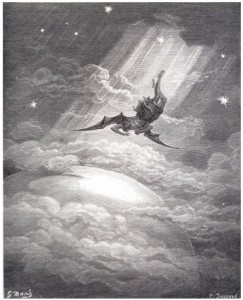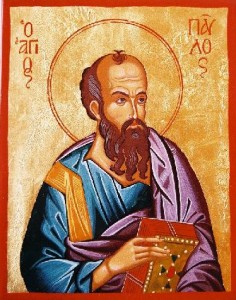 If you knew that the end of the world was tomorrow, would you go to work? Probably not… What about if it was in six months or a year? How sure would you have to be to sell everything to don a placard warning the world, “The end is nigh”? What if you were wrong? Well that’s precisely what happened with many of Harold Camping’s followers.
If you knew that the end of the world was tomorrow, would you go to work? Probably not… What about if it was in six months or a year? How sure would you have to be to sell everything to don a placard warning the world, “The end is nigh”? What if you were wrong? Well that’s precisely what happened with many of Harold Camping’s followers.
I live in NC and I distinctly remember a news story from last year about a local couple who sold everything and bought an RV painted with “May 21, 2011 Judgment Day!” to drive cross country warning each successive town.[1] People even sold their homes and cashed in their kids’ college funds! It’s pretty tragic. I can only imagine how they feel now. I wonder if their faith in the Gospel has been shaken. Still yet, if they had studied scripture, they should have known better.
In studying 1st and 2nd Thessalonians, I am struck at the remarkable relevance of the first century situation to the recent Harold Camping debacle. Located in the northwest corner of the Aegean Sea, Thessalonica is eponymously entitled after Alexander the Great’s half-sister.[2] Acts 17 reports that on Paul’s initial visit, his preaching in the synagogue led to many converts albeit causing the unbelieving Jews to riot in protest. The unbelieving Jews brought charges of subversion against Paul, Silas and Timothy. Interestingly, the trumped up charges could have stemmed from eschatology. Predicative prophesying had actually been made a capital crime in the Roman Empire due the tendency for it to cause political unrest. [3] Dio Cassius’ Roman History records the edict by Augustus in AD 11:
5 Besides these events at that time, the seers were forbidden to prophesy to any person alone or to prophesy regarding death even if others should be present. Yet so far was Augustus from caring about such matters in his own case that he set forth to all in an edict the aspect of the stars at the time of his own birth. Lvi 25.5
In fact, Tiberius upped the ante and made it punishable by death in A.D. 16:
8 But as for all the other astrologers and magicians and such as practiced divination in any other way whatsoever, he put to death those who were foreigners and banished all the citizens that were accused of still employing the art at this time after the previous decree by which it had been forbidden to engage in any such business in the city; but to those that obeyed immunity was granted. Lvii 15.8
Good thing for Camping we aren’t under Roman law! Because Paul had instructed the Thessalonians on the predicted return of Christ, his eschatological preaching could have easily been twisted by his enemies into such a charge. Fortunately, Paul slipped out of town to Berea, then on to Athens and Corinth where he received a report from Timothy about the Thessalonians which prompted the first letter (1 Thess. 3:6). Paul wrote in response to encourage them during the ensuing persecution and trials. He also wrote to clear up some misconceptions about his motives and doctrinal matters, primarily eschatology.
In the first letter, it seems some new converts had begun to worry about their loved ones who had already passed away prior to the return of Christ. Would they miss out? He assured them that they would rise first and that those still alive would join them in the air (1 Thess 4:17). This is the famous rapture passage from the Latin rapturo rendering of the Greek harpazo for “caught up.” Additionally, he admonished to abstain from sexual immorality and the proper use of spiritual gifts. However, it appears that a first century date setter caused a ruckus shortly after Paul’s letter was received.
Accordingly, the second letter to the Thessalonians seems to be a response correcting the misinformation from a forged letter bearing Paul’s name which led them to conclude that the day of the Lord had already occurred (2 Thess 2:2).[4] Perhaps it was an invisible judgment, Camping style? Paul assures them that it had not and that they would know when it was truly near because of a preceding apostasy and appearance of Antichrist (2 Thess 2:3). Apparently, eschatological fervor had led some to quit their jobs as well ( 2 Thess 3:11). Accordingly, Paul admonished them about a proper work ethic (2 Thess 3:12). This is exactly what occurred with many Camping followers who quit their jobs, drove cross country in RVs and foolishly financed billboards. This puts Harold Camping in the same category as the forger who usurped Paul with his bogus letter. The Lord made it clear, “But concerning that day or that hour, no one knows, not even the angels in heaven, nor the Son, but only the Father” (Mk 13:32).
This sign appeared off I-40 in NC on May 22, 2011.
[1] “End of Days in May? Believers enter final stretch” http://www.msnbc.msn.com/id/40885541/ns/us_news-life/t/end-days-may-believers-enter-final-stretch/ (accessed 6/9/2011).
[2] Thomas D. Lea and David Alan Black, The New Testament : Its Background and Message, 2nd ed. (Nashville, Tenn.: Broadman & Holman Publishers, 2003), 377.
[3] F. F. Bruce, Paul: Apostle of the Heart Set Free (Grand Rapids: Eerdmans Publishing Co., 1977), 226.
[4] Lea and Black, The New, 380.







